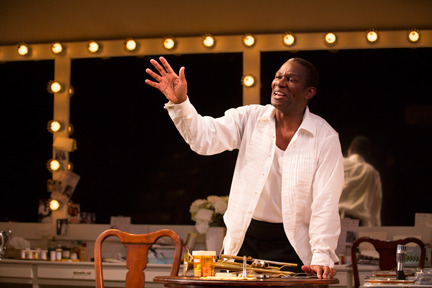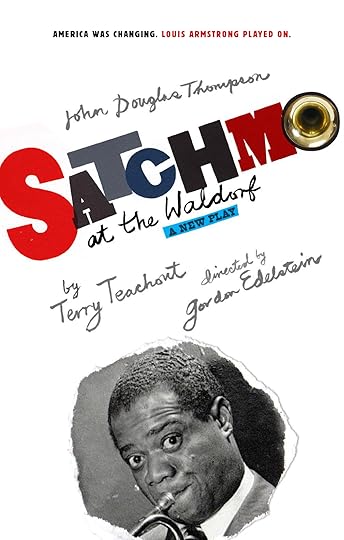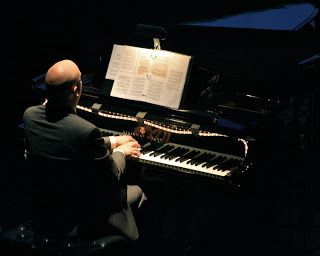Terry Teachout's Blog, page 28
January 14, 2014
ABOUT "ABOUT LAST NIGHT" AND ITS AUTHORS
Terry writes about the other arts, too--books, ballet, painting and sculpture, film and TV, whatever happens to catch his eye or ear. In addition to his drama column, Terry writes "Sightings," a biweekly column about the arts in America, for the Friday Wall Street Journal.
Laura Demanski is a Chicago-based writer with experience as an editor, critic, graduate student, and teacher. Laura's book reviews appear in the Baltimore Sun and the Chicago Tribune. Naturally drawn to the medium-hot centers of this world, she is a fierce advocate of her adopted Second City but still feels at home when she visits her one-time stomping grounds of Manhattan. A serious media addiction helps her keep close tabs on the red-hot from her comfy but happening city by the lake. She worries she should shoulder more guilt about her guilty pleasures--which include pro hockey, cop and lawyer shows, Las Vegas, and the colorful adventures of Travis McGee--but they're all just so damn pleasurable. More presentably, she's into Romantic poetry, Henry James, landscape painting, modern dance (with and without shoes, if you know what she means), and Edward Gorey. But she's not always sure she doesn't have some of those items in the wrong column.
Carrie A.A. Frye is a writer living in Asheville, North Carolina. She has lived in the mountain city for about a dozen years but retains strong traces of a Wisconsin accent. A graduate of Amherst College, she has worked as a reporter, editor and copywriter, but only because positions as a dancer, ship naturalist, and super-spy were unobtainable. Her reading habits are omnivorous, with literary fiction, mysteries, books on bugs, accounts of Polar exploration, and science fiction/fantasy all fair game for discussion. She mourns Buffy, loves Project Runway and has an appalling weakness for movies where people either break into song or onto Broadway. She also knows a lot of unexpected things about sports. Before joining "About Last Night" she was the proprietor of the litblog Tingle Alley.
Clement Greenberg, the great art critic, believed that "in the long run there are only two kinds of art: the good and the bad. This difference cuts across all other differences in art. At the same time, it makes all art one....the experience of art is the same in kind or order despite all differences in works of art themselves." We feel the same way, which is why we write about so many different things. We think many people--maybe most--approach art with a similarly wide-ranging appreciation. By writing each day about our own experiences as consumers and critics, we hope to create a meeting place in cyberspace for arts lovers who are curious, adventurous, and unafraid of the unfamiliar.
January 13, 2014
TT: A dream come true
 Satchmo at the Waldorf, my first play, is coming to New York at last.
Satchmo at the Waldorf, my first play, is coming to New York at last.Here is part of the official press release. For more information, go here .
* * *
It was announced today that, following acclaimed, sold-out runs at Long Wharf Theatre and Shakespeare and Company, Terry Teachout's play Satchmo at the Waldorf will enjoy a New York premiere this spring. Starring John Douglas Thompson and directed by Gordon Edelstein, Satchmo at the Waldorf will begin performances at Off Broadway's Westside Theatre (407 West 43rd Street) on Saturday, February 15. Opening night is set for Tuesday, March 4, 2014.
In March of 1971, one of the greatest music legends the world would ever know was performing the final set of shows he would ever play at New York's Waldorf Astoria Hotel. But the audiences who adored him onstage never really saw the man behind the trumpet. In Terry Teachout's searing and surprisingly intimate play, Satchmo at the Waldorf, we encounter Louis Armstrong where few ever had the chance to see him: backstage. Reflecting on his own unlikely career amidst a rapidly changing society, the icon is stripped bare, revealing complexities and contradictions that his omnipresent smile, horn and handkerchief belied. Critically acclaimed actor John Douglas Thompson, seamlessly morphing between Armstrong, his manager Joe Glaser, and fellow trumpeter Miles Davis, gives one of the most vivid portraits ever created for the stage....
Tickets for Satchmo at the Waldorf, priced at $39 and $79, are available online via Telecharge.com or by phone at (212) 239-6200/(800) 447-7400. Tickets will also be available for purchase in person, at the Westside Theatre Box Office (407 West 43rd Street).
* * *
Here's the poster:

TT: Lookback
I've been deeply immersed in the world of words my whole life long. I started playing with my mother's portable typewriter as a child. I really did read the dictionary for pleasure. I launched my first periodical, a mimeographed newspaper, in junior high school, and God only knows how many millions of words I've published since then. Yet I've never been one for wordplay, perhaps because I'm no good at it. Be it Scrabble, Boggle, or Wheel of Fortune, I invariably come up short, a deficiency that never fails to surprise friends who take it for granted that I excel at such games....
Read the whole thing here .
ABOUT TERRY'S PLAY AND OPERA LIBRETTI
To see John Douglas Thompson on stage in Satchmo at the Waldorf, go here. To watch a Wall Street Journal-produced video interview with Terry, go here. To read Terry's program note, go here.
To read the Boston Globe review, go here. To read the New York Times review, go here. To read a New York Times feature about the play, go here. To listen to a radio interview with Terry and John, go here.
To see a video of excerpts from the 2011 Orlando production of Satchmo at the Waldorf, starring Dennis Neal, go here.
•
Terry has also written the libretti for three operas by Paul Moravec. The latest is The King's Man, a one-act drama about Benjamin and William Franklin that was premiered by Kentucky Opera on Oct. 11, 2013. For more information, go here and here. To read an essay by Terry about The King's Man, go here.
The King's Man is a companion piece to their second opera, Danse Russe, a one-act backstage comedy about the making of The Rite of Spring that was commissioned by Philadelphia's Center City Opera Theater and premiered there on April 28, 2011. (It was later revived by Kentucky Opera on the same bill as The King's Man.) To read more about Danse Russe, go here and here. To view excerpts from the opera and see Paul and Terry talk about its creation, go here.
Terry and Paul began their collaboration with The Letter, a full-evening operatic version of Somerset Maugham's 1927 play that was commissioned by the Santa Fe Opera in 2006 and opened there on July 25, 2009. To see excerpts from the opera, go here.
Below are links to Terry's reports on the writing, staging, premiere, and reception of the original production of The Letter:
Lend me your ears (and eyes)
Men at work
Men at work (II)
Men at work (III)
Men at work (IV)
For better and worse
Men at work (V)
Men (and women) at work (VI)
Notes from an unkept diary
The case for lower-case opera
The envelope, please
Right turn at Albuquerque
Moment's notice
Men at work (VII)
Scene stealing (I)
Scene stealing (II)
Becoming an artist
In one piece
Among the brethren
By the clock
Size matters
No, but I heard the movie
The Doctor is in
A doll's house
Free at last
Looking for trouble
Cover story
Step away from the car, sir
A ripping good show
All blessings are mixed
Almanac (apropos of The Letter, I)
Almanac (apropos of The Letter, II)
Almanac (apropos of The Letter, III)
Tied to the tracks
A very small world
A little taste
Now's the time
Another little taste
And...they're off!
Who'd have thought it?
Tweeting an opera
Head first
At the starting gate
Minute by minute
Modern opera in a nutshell
Pit stop
All there is
The news in brief
In a mist
Did Maugham know best?
We know every part by heart
How it felt
Unrest cure
Blowin' in the wind
TT: Almanac
John Updike, Toward the End of Time
January 12, 2014
TT: Just because
(This is the latest in a series of arts-related videos that appear in this space each Monday and Wednesday.)
TT: Almanac
Anthony Trollope, The Last Chronicle of Barset
January 10, 2014
TT: Lookback
Since we're on the subject of me, my brother and his daughter were looking at Smalltown High School yearbooks at the dinner table last night, some of which were published back when I edited the high-school newspaper. That was--gulp--30 years ago. As my niece made fun of the hair styles of 1974, I found myself recalling some of the ways in which I first became aware of the larger world of art and culture, and it occurred to me that in lieu of a more formal chronicle, it might be interesting to draw up a list of cultural firsts....
Read the whole thing here .
January 8, 2014
TT: Read all about it
 Jazz pianist Ethan Iverson, whose work with
the Bad Plus
and on his own will be well known to longtime visitors to this space, recently interviewed me for his widely read and deservedly influential blog,
Do the Math
. We talked at length and in considerable detail about
Duke: A Life of Duke Ellington
, as well as a variety of other subjects ranging from my recent efforts as a playwright and opera librettist to our shared admiration for Anthony Powell, Rex Stout, and Donald Westlake:
Jazz pianist Ethan Iverson, whose work with
the Bad Plus
and on his own will be well known to longtime visitors to this space, recently interviewed me for his widely read and deservedly influential blog,
Do the Math
. We talked at length and in considerable detail about
Duke: A Life of Duke Ellington
, as well as a variety of other subjects ranging from my recent efforts as a playwright and opera librettist to our shared admiration for Anthony Powell, Rex Stout, and Donald Westlake:I think it's very foolish to compare Westlake to Proust, as I've actually seen done in print. In the first place, it's stupid--and in the second place, you don't need to. Donald Westlake's place in the history of literature is quite adequately secured by virtue of his having been Donald Westlake. He doesn't have to be anything else.
This is true of jazz as well. An important secondary theme in my Ellington book is when classical musicians first discovered jazz and started writing about it. It matters. I don't deprecate the significance of the fact that Constant Lambert, Percy Grainger and Aaron Copland understood what Ellington was early in his career. But some people think that in order to take Duke Ellington seriously as a composer, we have to believe that he was successful as a composer of large-scale works. The idea, I guess, is to push him up into the classical-music arena: he played in Carnegie Hall, therefore he's serious. And that's completely wrong. Duke Ellington is serious because he is Duke Ellington. He's serious because of the work itself....
In addition to posting a carefully edited transcript of the interview, Ethan has also written an accompanying essay about Ellington called "Reverential Gesture" in which he discusses in a thoroughly civil manner his differences with some of the musical analysis in Duke, engaging with what I actually wrote in the book rather than caricaturing it. Unlike some of my less temperate critics, he read Duke closely--and took it seriously. I expected no less.
You can read both the interview and the essay by going here .
January 7, 2014
TT: Snapshot
(This is the latest in a series of arts-related videos that appear in this space each Monday and Wednesday.)
Terry Teachout's Blog
- Terry Teachout's profile
- 45 followers



